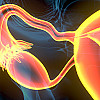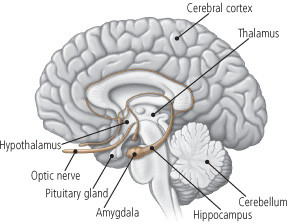Recent Blog Articles

Lead poisoning: What parents should know and do

How does waiting on prostate cancer treatment affect survival?

Does running cause arthritis?

Is alcohol and weight loss surgery a risky combination?

Preventing ovarian cancer: Should women consider removing fallopian tubes?

Healthier planet, healthier people

Is snuff really safer than smoking?

Will miscarriage care remain available?

Considering collagen drinks and supplements?

Does less TV time lower your risk for dementia?
Pituitary Tumors
What Is It?
The pituitary gland is a pea-sized structure that is attached to the undersurface of the brain by a thin stalk. It is protected by a cradle of bone called the sella turcica, which is located above the nasal passages, almost directly behind the eyes. The pituitary gland sometimes is called the master gland because it produces hormones that regulate many bodily functions, including the production of:
- Thyroid hormone
- Sex hormones, such as estrogen and testosterone
- Adrenalin
- Growth hormone
- Breast milk
- Anti-diuretic hormone that helps control water balance
|
When tumors develop in the pituitary gland, they are usually small, localized, slow-growing masses that start in one type of hormone-producing pituitary cells. Although these tumors almost always are benign (noncancerous), they have the potential to cause significant symptoms by:
To continue reading this article, you must log in.
Subscribe to Harvard Health Online for immediate access to health news and information from Harvard Medical School.
- Research health conditions
- Check your symptoms
- Prepare for a doctor's visit or test
- Find the best treatments and procedures for you
- Explore options for better nutrition and exercise
I'd like to receive access to Harvard Health Online for only $4.99 a month.
Sign Me UpAlready a member? Login ».
Disclaimer:
As a service to our readers, Harvard Health Publishing provides access to our library of archived content. Please note the date of last review or update on all articles.
No content on this site, regardless of date, should ever be used as a substitute for direct medical advice from your doctor or other qualified clinician.
Free Healthbeat Signup
Get the latest in health news delivered to your inbox!

